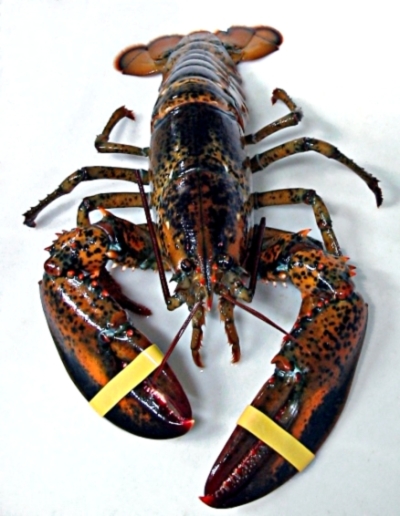No, PETA, Animals Are Not People Too

Three headlines in quick succession over the past few days got me thinking about how my fellow Americans are thinking about animals and personhood.
PETA, the People for the Ethical Treatment of Animals, have a new ad campaign equating the eating of crustaceans (crabs in Maryland and lobsters in Maine) with cannibalism. The tag lines and visuals are provocative.
If we believe what God has said in the Bible about the intentional creation of all things – the intentional created order including human beings in His image, distinct from animals and all other creatures even in the heavenly realms, then we must resist the efforts of those who would equate animals with people. PETA isn't just trying to insure the ethical treatment of animals, as their name might suggest, they are attempting to convince human beings that to eat animals equates with cannibalism. (That is not to say there are not some very good reasons to be a vegan, but this is not one of them.)
Next was the headline about the real mistreatment of animals by their opioid-addicted owners in order that veterinarians would prescribe narcotics that the people then abuse.
The consequences of sin here are evident. Having succumbed to the power of addiction, people will do anything – including abuse animals – to satiate that which is actually insatiable. The fact that animals are owned as pets, subject to abuse, unable to tell someone they are being hurt by someone in their home, unable to fill, pay for and manage their own prescription medications, is all evidence of the distinction between human beings and animals.
Then there is the news that a Minnesota company is now offering paid furternity leave for new adoptive pet owners.
Notably, we don't call new adoptive parents owners so part of the confusion here is in the application of words like adoption to pets. We give them names, they do not name us.
What then is the difference between human beings and animals? To answer this question we find ourselves at a critical point in worldview discourse. If we assert that human persons are persons and animals are not, on what basis do we make that claim? I make that claim based on what God reveals about the intentional creation of all things – including animals and human beings. In the Creation account, God makes clear that human beings are unique, categorically different, by design. God made human beings in His image. The same cannot be said of any other creature (not animals nor angels). Human beings are alone created in the image of God (Genesis 1) and human beings, as God's self-reflective, morally responsible stewards, are charged by God to care for, and carefully use, everything God places under their dominion. That means we care for animals with the same concern with which we care for the most vulnerable people but we do not confuse the two. People are not animals and ought not be treated as such; nor are animals people.
The story of Noah is relevant here. God commanded a human being to build a massive ark in the middle of the desert and then God rounded up the animals in order that they might be preserved. Noah built the ark, animals did not. All humanity and every other living thing perished in the great flood. The consequences of human sin are real and they are experienced and felt throughout Creation. Scripture confirms that Creation itself is groaning with eager longing for Man's redemption precisely because we are uniquely saved in Christ Jesus. And at the consummation of all things, all Creation will also experience a renewal to pre-fall realities.
There are animals who we recognize as having extraordinarily complex brains and social behaviors (whales, dolphins, elephants), and animals have a beauty we are to recognize, appreciate and admire – but never worship. They too declare the glory of God but the Bible makes clear they are also distinct from human beings. So, while we thank God for creating them, we do not elevate them to the status of human persons – nor beyond that, exchange the worship of the Creator with creation (read Romans 1).
Here is the ethical line that grows fuzzy in the minds of many people today: if there is a hungry child and a hungry animal, which do we feed? There are actually those today who would here ask what kind of animal because, they argue, if the animal represents an endangered species then the preservation of the life of the animal is morally imperative. The child, they will note, does not represent an endangered species. This was the argument made in the aftermath of the killing of Harambe the Gorilla when a child fell into the animal's enclosure at an Ohio zoo.
Clarification is here necessary. I support the ethical treatment of animals and I deplore their mistreatment. But we must not become confused about the relative worth of a human being and any animal. When animal advocates seek to elevate animals to the status of human beings what they accomplish instead is the devaluing of humans, threatening the dignity of every person.
For nearly a decade, animal rights advocates have been working to see language adapted and laws adopted to create a status of non-human persons. Dolphins, chimpanzees, apes and other animals are declared by some to possess personhood, although they are not human persons. Watch for language equating characteristics like personality, intelligence, future planning, social networking to personhood. Note also that those performing these behavioral studies on animals are well, making a study of the animals and publishing papers, not the other way around.
The research findings may well be valid. I have no reason to doubt that animals have distinct individualized characteristics, the ability to think and communicate. But does that mean we should regard them as persons with equal rights to human beings?
There is no denying the fact that pets have personality but that does not equate with personhood. The word for what we're doing when we project human attributes onto animals – mind, intelligence, conscience – is anthropomorphism. In the same way it is wrong to reduce God to human categories so we can get our minds around Him, so too it is wrong to assign humanness to animals from whom God has made us categorically distinct. In so doing we literally exchange the truth about God and ourselves for lies and worship the creature instead of the Creator.
The moral implications of this conversation are massive. We do not eat people, so if – as PETA now asserts, crabs and lobsters are persons, then, well, it logically follows we must not eat them. Now imagine you sincerely believe that animals are people. What would you not do to stop people from eating them? This is where veganism becomes a militant worldview whose adherents would stop at nothing to see the rights of non-human persons recognized by society writ large.
There is a legitimate role for organizations like PETA to engage in efforts to stop the intentional abuse of animals by sinful human beings. God has set us as stewards over all that He has made and that includes the just stewardship, protection and appreciation of animals. But let us never confuse the categories: people are persons, crustaceans are not. And if crustaceans are not, then cows are not, chimps are not, animals are not. It is certainly true that some people are crabs, but the reverse does not hold true.
Originally posted at The Reconnect.



























